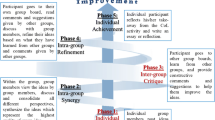Abstract
The purpose of this study is to refine Japanese elementary science activity structures by using a CSCL approach to transform the classroom into a knowledge-building community. We report design studies on two science lessons in two consecutive years and describe the progressive refinement of the activity structures. Through comparisons of student activities on- and off-line, it was found that the implementation of a CSCL environment facilitated students' idea-centered activity. The task requirement for students to engage in collective and reciprocal activities reflecting on their own ideas was also effective if it required students to use their conceptual understanding for producing something concrete.
Similar content being viewed by others
References
Brown, A. L., & Campione, J. C. (1996). Psychological theory and the design of innovative learning environments: On procedures, principles, and systems. In L. Shauble, & R. Glaser (Eds.), Innovations in learning: New environments for education (pp. 289–325). Mahwah, New Jersey: Lawrence Erlbaum.
Collins, A., Joseph, D., & Bielaczyc, K. (2004). Design research: Theoretical and methodological issues. The Journal of the Learning Sciences, 13(1), 15–42.
Hakkarainen, K., & Sintonen, M. (2002). The interrogative model of inquiry and computer-supported collaborative learning. Science & Education, 11, 25–43.
Hintikka, J. (1988). What is the logic of experimental inquiry? Synthese, 74, 173–190.
Klahr, D. (2000). Exploring science: The cognition and development of discovery processes. Mahwah, New Jersey: Lawrence Erlbaum.
Lee, E. Y. C., Chan, C. K. K., & van Aalst, J. (2006). Students assessing their own collaborative knowledge building. International Journal of Computer-Supported Collaborative Learning, 1(1), 57–87.
Linn, M. C., Lewis, C., Tsuchida, I., & Songer, N. B. (2000). Beyond fourth-grade science: Why do US and Japanese students diverge? Educational Researcher, 29(3), 4–14.
Oshima, J., Oshima, R., Inagaki, S., Takenaka, M., Nakayama, H., Yamaguchi, E. et al. (2003). Teachers and researchers as a design team: Changes in their relationship through a design experiment using Computer Support for Collaborative Learning (CSCL) technology. Education, Communication, and Information, 3(1), 105–127.
Oshima, J., Oshima, R., Murayama, I., Inagaki, S., Takenaka, M., Yamamoto, T. et al. (2002). CSCL design experiments in Japanese elementary science education: Hypothesis testing lesson and collaborative construction lesson. Annual Meeting of the American Educational Research association, April 1–4, New Orleans, Louisiana.
Rohlen, T., & LeTendre, G. (Eds.) (1995). Teaching and learning in Japan. New York, New York: Cambridge University Press.
Scardamalia, M. (2002). Collective cognitive responsibility for the advancement of knowledge. In B. Smith (Ed.), Liberal education in a knowledge society (pp. 67–98). Chicago, Illinois: Open Court.
Scardamalia, M., & Bereiter, C. (2002). Knowledge building. In Encyclopedia of education, Second Edition (pp. 1370–1373). New York: Macmillan, USA.
Author information
Authors and Affiliations
Corresponding author
Rights and permissions
About this article
Cite this article
Oshima, J., Oshima, R., Murayama, I. et al. Knowledge-building activity structures in Japanese elementary science pedagogy. Computer Supported Learning 1, 229–246 (2006). https://doi.org/10.1007/s11412-006-8995-8
Received:
Revised:
Accepted:
Published:
Issue Date:
DOI: https://doi.org/10.1007/s11412-006-8995-8




